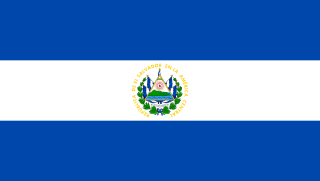
El Salvador, officially the Republic of El Salvador, is a country in Central America. It is bordered on the northeast by Honduras, on the northwest by Guatemala, and on the south by the Pacific Ocean. El Salvador's capital and largest city is San Salvador. The country's population in 2023 was estimated to be 6.5 million.

El Salvador is a country in Central America. Situated at the meeting point of three tectonic plates, it is highly seismologically active and the location of numerous earthquakes and volcanic eruptions. The country has a tropical climate.
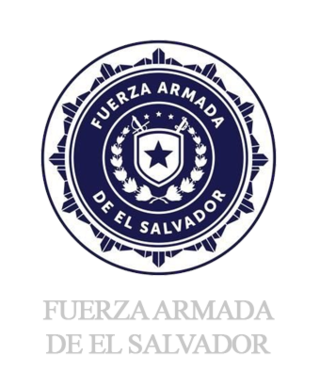
The Armed Forces of El Salvador are the official governmental military forces of El Salvador. The Forces have three branches: the Salvadoran Army, the Salvadoran Air Force and the Navy of El Salvador.

The Nationalist Republican Alliance is a conservative, center-right to right-wing political party of El Salvador. It was founded on 30 September 1981 by retired Salvadoran Army Major Roberto D'Aubuisson. It defines itself as a political institution constituted to defend the democratic, republican, and representative system of government, the social market economy system and nationalism.
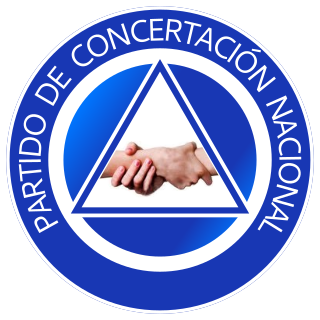
The National Coalition Party is a nationalist political party in El Salvador. Until 2011 it was known as the National Conciliation Party. It was the most powerful political party in the country during the 1960s and 1970s, and was closely associated with the Salvadoran military. Julio Adalberto Rivera Carballo, a candidate of the National Conciliation Party, was elected president in 1962, and the next three presidents were also from the party. After the 1979 coup the party declined in influence but continued to exist.

José Gerardo Barrios Espinoza was a Salvadoran military officer and politician who served as president of El Salvador on three occasions between June 1858 and his overthrow in October 1863.

Rafael Antonio Gutiérrez was the president of El Salvador from 10 June 1894 to 13 November 1898. He was a leader of the Revolution of the 44 which overthrew President General Carlos Ezeta from April to June 1894. Gutiérrez served as provisional president until being officially inaugurated in March 1895 after his victory in the 1895 presidential election, in which he was the only candidate.

The Christian Democratic Party is a Salvadoran political party. From 2011 to 2012, the party was renamed to Party of Hope before reverting to the Christian Democratic Party. The PDC has been led by Reinaldo Carballo since 2023.

Legislative elections were held in El Salvador on 31 March 1985. The result was a victory for the Christian Democratic Party, which won 33 of the 60 seats. Voter turnout was 42%.

Legislative elections were held in El Salvador on 8 March 1970. The result was a victory for the National Conciliation Party, which won 34 of the 52 seats. However, the election was marred by massive fraud. Voter turnout was just 41.6%.
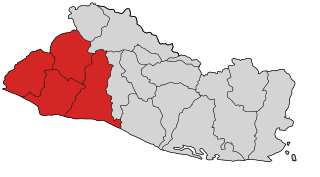
La Matanza refers to a communist-indigenous rebellion that took place in El Salvador between 22 and 25 January 1932. After the revolt was suppressed, it was followed by large-scale government killings in western El Salvador, which resulted in the deaths of 10,000 to 40,000 people. Another 100 soldiers were killed during the suppression of the revolt.

Coffee production in El Salvador has fueled the Salvadoran economy and shaped its history for more than a century. Rapidly growing in the 19th century, coffee in El Salvador has traditionally provided more than 50% of the country's export revenues, reaching a peak in 1980 with a revenue of more than $615 million. With the political and economic turmoil resulting from a civil war in the 1980s, the coffee industry has struggled to recover entirely, and by 1985 earned around $403 million from coffee. Brazil has been buying to sell the goods of El Salvador.

Presidential elections were held in El Salvador on 20 February 1972. The result was a victory for Arturo Armando Molina of the Party of National Conciliation (PCN), who received 43% of the vote. However, the election was characterised by massive fraud. The PCN had faced a strong challenge from left- and right-wing opposition, and as a result had tried to rig the election by holding the presidential elections two weeks before the legislative election to ensure that if Molina failed to pass the 50% mark, the Legislative Assembly would still be under PCN control to approve him as president. Despite their attempts to stuff ballot boxes, it looked for a while as though José Napoleón Duarte of the opposition National Opposing Union had been victorious after the Central Election Board in San Salvador issued a statement that Duarte had won by around 6,000 votes. However, this was followed by a three-day news blackout, after which a revised set of figures was announced giving a narrow victory to Molina, meaning that the Legislative Assembly would choose the president. The opposition walked out of the vote, resulting in Molina being elected by 31 votes to zero.

The Salvadoran military dictatorship was the period of time in Salvadoran history where the Salvadoran Armed Forces governed the country for almost 48 years from 2 December 1931 until 15 October 1979. The authoritarian military dictatorship limited political rights throughout the country and maintained its governance through rigged and fixed elections.
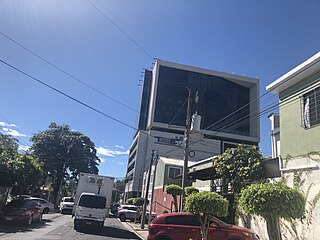
The Supreme Electoral Court is the highest electoral authority in the country of El Salvador.

The Palm Sunday Coup was an attempted military coup d'état in El Salvador which occurred in early-April 1944. The coup was staged by pro-Axis sympathizers in the Salvadoran Army against President General Maximiliano Hernández Martínez.
Anarchism in El Salvador reached its peak during the labour movement of the 1920s, in which anarcho-syndicalists played a leading role. The movement was subsequently suppressed by the military dictatorship before experiencing a resurgence in the 21st century.
Salvadoran nationality law is regulated by the Constitution; the Legislative Decree 2772, commonly known as the 1933 Law on Migration, and its revisions; and the 1986 Law on Foreigner Issues. These laws determine who is, or is eligible to be, a citizen of El Salvador. The legal means to acquire nationality and formal membership in a nation differ from the relationship of rights and obligations between a national and the nation, known as citizenship. Salvadoran nationality is typically obtained either on the principle of jus soli, i.e. by birth in El Salvador; or under the rules of jus sanguinis, i.e. by birth abroad to a parent with Salvadoran nationality. It can also be granted to a citizen of any Central American state, or a permanent resident who has lived in the country for a given period of time through naturalization.
The 1972 Salvadoran coup d'état attempt occurred from 25 to 26 March 1972 when young military officers attempted to overthrow the government of Fidel Sánchez Hernández, prevent the presidency of Arturo Armando Molina, and proclaim José Napoleón Duarte as President of El Salvador. The coup was suppressed and its leaders were exiled from the country.
The El Salvador–Honduras football rivalry is a sports rivalry between the El Salvador and Honduras national football teams. The rivalry between the two nations peaked in 1969 when both teams played each other in the 1970 FIFA World Cup qualifiers, and the matches they played between each other, which ultimately saw El Salvador advance to the 1970 FIFA World Cup, were a contributing factor which led to the outbreak of the Football War in July 1969.












